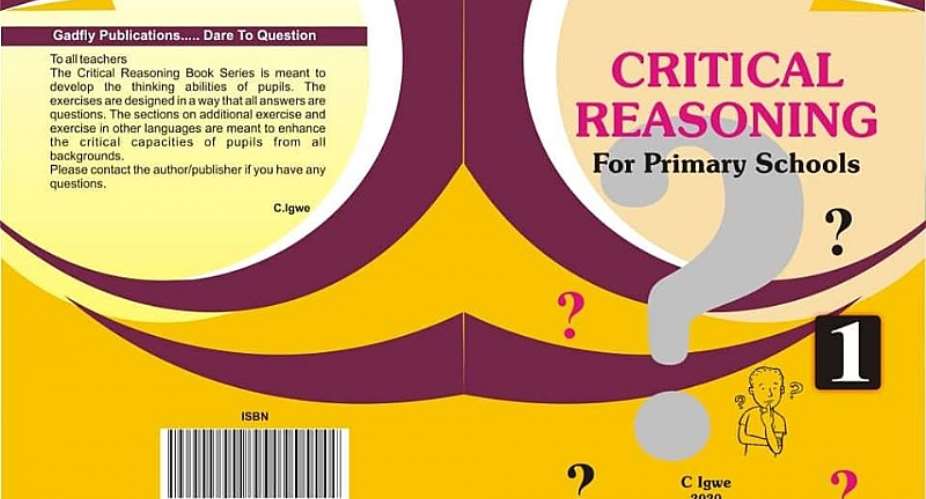Today I announce an exciting program for schools in Nigeria, the Thought Project. The objective of this project is to foster critical and creative thinking skills in pupils and students and to introduce critical thinking and creative reasoning as subjects in primary and secondary schools. Critical and creative thinking skills are among the most sought after skills by employers. While there has been much emphasis on the need for critical and creative thinking, there are no subjects or programs that are devoted to inculcating these intellectual virtues. To realize a critical and creative thinking society, these thinking skills have to be taught and learned. The thought project is an effort to fill this gap in education and learning in the country.
The thought project has been several years in the making-since 2003/2004. Unfortunately, it has been postponed or set aside for some reason. This year, I decided to go ahead with the project, then came the COVID19 pandemic. Schools have been closed. There has also been a delay in incorporating an NGO that will facilitate the project. Despite all these challenges, I have decided that the thought project can no longer wait. Efforts to promote critical and creative thinking in schools and the society at large will go on, COVID19 or no COVID19. The project will release books on critical reasoning and then books on creative thinking. The books are in a workbook format with ample spaces for additional exercise.
The publication of critical reasoning books has started. The books will be released based on the availability of funds and the resumption of schools. In the first phase, we are publishing books 1 to 3 for the lower basic primary classes. Book 1 will be out next week. Books for the upper basic primary classes 4 to 6 will follow. We shall then embark on publishing creative reasoning books for primary schools.
Critical thinking has been defined as the ability to analyze, synthesize, and evaluate information. But to introduce this topic to primary school pupils, an operationalized definition is needed. To this end, critical reasoning is defined as asking questions. Modules have been created to encourage pupils to ask questions and express their curiosity. Children are taught to be inquisitive and to interrogate whatever they see, hear touch or smell, or taste. The target pupils are those who speak English as a second language. So, there is a provision to deliver the lessons and conduct exercises in languages other than English.
Besides, thought laboratories will be organized. A thought laboratory is both a program and an infrastructure. As a program, a thought laboratory is a workshop where pupils are taught to exercise their critical thinking skills. Schools are also encouraged to erect buildings or designate a room or an apartment as a thought laboratory. I am looking forward to opening the first thought laboratory building in Nigeria very soon- this year or next year. At the moment, the critical thinking workshops, including training for teachers, will be organized free of charge. The thought project will raise funds to defray the costs of the workshops. Participants in the thought laboratory will receive free copies of the books. And if the program succeeds in Nigeria, it will be extended to other African countries. The thought project is in its pilot phase. So criticisms are welcome and will help improve the quality of the books and the entire program.





 We’ll no longer tolerate your empty, unwarranted attacks – TUC blasts Prof Adei
We’ll no longer tolerate your empty, unwarranted attacks – TUC blasts Prof Adei
 Bawumia donates GHc200,000 to support Madina fire victims
Bawumia donates GHc200,000 to support Madina fire victims
 IMF to disburse US$360million third tranche to Ghana without creditors MoU
IMF to disburse US$360million third tranche to Ghana without creditors MoU
 Truck owner share insights into train collision incident
Truck owner share insights into train collision incident
 Paramount chief of Bassare Traditional Area passes on
Paramount chief of Bassare Traditional Area passes on
 Two teachers in court over alleged illegal possession of BECE papers
Two teachers in court over alleged illegal possession of BECE papers
 Sunyani: Victim allegedly shot by traditional warriors appeals for justice
Sunyani: Victim allegedly shot by traditional warriors appeals for justice
 Mahama vows to scrap teacher licensure exams, review Free SHS policy
Mahama vows to scrap teacher licensure exams, review Free SHS policy
 Government will replace burnt Madina shops with a new three-story, 120-store fac...
Government will replace burnt Madina shops with a new three-story, 120-store fac...
